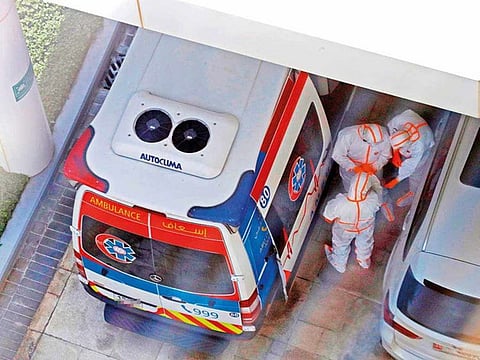Watch how coronavirus patients are treated in UAE
UAE Health Ministry explains everything you should know about isolation and quarantine

Dubai: What is the difference between isolation and quarantine? What happens to the patients who have been isolated in the UAE?
The Ministry of Health and Prevention has answered these and other questions for residents as part of its Covid-19 awareness programme. The ministry has also released social media posts and a video series in this connection.
In one such video interview by TV host Marwan Al Hel, Dr Adil Al Sajwani, family medicine specialist at the ministry, has clarified many doubts that residents may have and explained the procedures in place in the country.
The video also shows a demonstration of how patients are being taken care of in the UAE.
Isolation vs quarantine
Explaining the difference between isolation and quarantine, Dr Al Sajwani said isolation is meant for patients infected with the novel coronavirus while quarantine is for individuals who have had contacts with infected people.
He said Covid-19 patients are isolated from other patients.
“We make sure that patients are recovering, following top international medical standards. We put them in sterile rooms with ventilation and negative pressure systems where the air enters the room and exits from special exhausts to make sure the virus does not spread,”
The patients are treated carefully by wearing customised, sterile, protective clothes and masks until the patient is fully recovered and goes back home.
“Quarantine at homes is a global strategy to reduce the spread of rapidly communicable diseases, and it is important,” said Dr. Al Sajwani.
Not house arrest!
People should not equate home quarantine with house arrest.
“It is not a prison. You can stay home naturally,” said Dr Al Sajwani.
“If you come from a country where the virus is widespread or you have contacted an infected person at work or school, we want to make sure you are not infected because symptoms may not appear for 14 days. That’s why we let people stay home for 14 days.”
Dos and Don’ts
You just have to stay in a specific room and it should be disinfected.
Don’t get in direct contact with others for seven to 14 days.
“Don’t meet visitors, put enough food in the room and deal with only one person at home who will bring you the stuff.”
You can spend time doing work, socialising on social media.
Personal hygiene
It is important to take good care of personal hygiene.
Quarantined person’s clothes should be washed only after other family members’ clothes are washed. They should be dried separately.
They should also use a separate toilet. In case there is no separate toilet, it should be used after others and cleaned and disinfected properly.
What about work?
Work places should give leave during this time or the employee can work remotely which is widely applied here, said Dr Al Sajwani.
In case any symptoms appear, the person should not go to the pharmacy but call health facilities concerned and they will check the patient accordingly.
“The medical team is always ready to help in case of any emergency. A dedicated medical team for quarantine is available 24/7 for support over the phone,” said Dr. Al Sajwani.
Blowing boredom away
People who have been quarantined or isolated for a period of time do not pose any health threat to others, especially after confirming that they are free of infection, the health ministry said.
While people might feel bored or worried during the isolation period, the ministry is reminding them that they have an important role in protecting others and encouraging them to stay positive and blow away the boredom by spending time on social media, exercising, reading and following other indoor hobbies.
“The positive aspect of such experience is having enough time to meditate, read, watch movies and practice hobbies.”
COVID-19 isolation, quarantine in a nutshell
Health authorities apply isolation and quarantine to take care of infected people and their contacts in order to protect healthy people.
Isolation is separation of ill persons, who have a communicable disease, from those who are healthy, so they can start the treatment without infecting others.
Infected individuals are isolated for treatment at hospitals.
Quarantine is restriction of movement of those who may have been exposed to a communicable disease but do not have a confirmed medical diagnosis to ensure they are not infected.
Healthcare providers are responsible for choosing the best place for people who are subject to quarantine –hospital, home or a private facility.
Quarantine does not mean total isolation but it involves voluntary movement restriction of individuals.
Quarantined individuals are provided with food and personal belongings.
Family members and friends can help them in carrying out daily tasks while taking into consideration preventive measures to prevent the spread of infection.
Quarantined persons will be under medical supervision.






